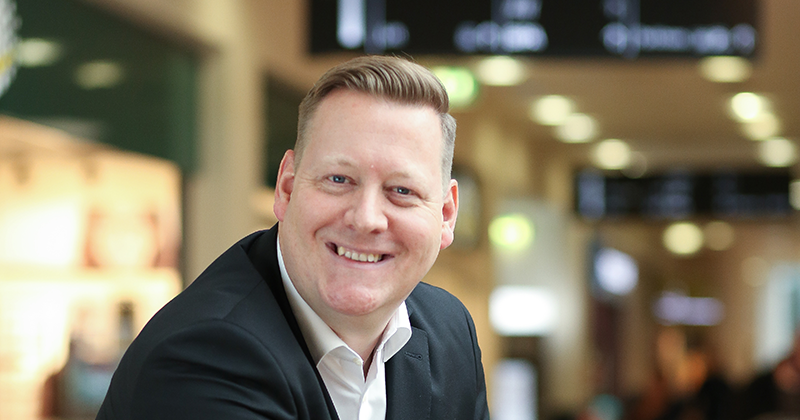
Thomas Pacal joined the next level consulting interim management team worldwide as an interim manager, trainer and coach in September 2017. In a short interview, he provides insights into himself and his work.
1) Can you describe yourself in a few words?
I am someone who is happy to be able to say unapologetically that I really love what I do. The resulting dedication is evident to anyone who knows me or works with me, both professionally and privately.
Of course, there is more to say about this:
It all supposedly started quite differently: during my several semesters of taster courses in internal medicine, where I learnt how to effectively help exactly 1 person at a time through critical situations, I asked myself how I could do this for as many people as possible at the same time.
I found the answer during my business psychology studies in England and the USA, where my medical perspective, of all things, made me realise that the diagnosis & therapy of complex macroorganisms can ultimately be transferred 1:1 to methods of organisational development.
Today, two decades later, I accompany well-known companies worldwide through success-critical transformation phases; I initiate change, typically also carry it out myself and restructure and re-stabilise the new organisation for a secure market re-entry.
2) What professional experiences do your clients benefit from?
Every single one I've ever had - I wouldn't want to miss any of them, as I've learnt a lot from absolutely every experience. My list of references reads accordingly (e.g. Goldman Sachs, Dexia, Crédit Lyonnais, Unicredit, Raiffeisen, The Zurich Group, Global Blue, McKinsey, Boston Consulting Group, Bain, Ernst&Young, Gerson Lehrman Group, BP, Essar/Hutchison, Hindustan Petroleum Corporation, Petroleum Corporation of South Africa, Baxter, Galenika, UCP, Goldbach, Lindt&Sprüngli, Coca Cola, General Motors, IBM, etc.).
My clients benefit above all from these 3 aspects:
- Internationality: valuable intercultural experience from my worldwide work on 4 continents in over 20 different countries and practically every time intercontinental collaboration with offshore teams, split across several time zones and language groups
- Communication: an emphatically empathetic approach that helps me to communicate beyond superficialities and thus gain buy-in, especially from employees who are resistant to change, in order to ensure a friction-free transformation process.
- Helicopter vision: clear, unbiased strategic foresight that I can ultimately only have as an external, unbiased observer - this brings blind spots and/or hidden gems that are critical to success into the light, which can be introduced or implemented without delay.
That's why my official company mission is: "Instead of fearing change, we utilise it and turn it into an unlimited, very real, sustainably stable resource."
3) What were your last assignments?
As different as the industries of my last clients may be, they all have one thing in common: the pressure to change that they are exposed to as a result of the digital transformation of both their immediate competitive environment and correlated supply sectors. They know that any further postponement means falling behind, from which they would never recover. My support therefore consisted of the rigorous concertation of success-critical transformation processes (change management, development of digital business models, setup of innovation hubs & internal think tanks, post-merger integration & restructuring in the context of M&As as well as re-stabilisation of programmes or complex IT projects that had gotten out of hand) for clients from the finance/banking/fintech, energy/oil & gas, life sciences/biotech, digital/IoT, marcoms, etc. sectors.
4) What do your clients particularly appreciate about your performance as an interim manager? And how do you manage to familiarise yourself with a new mandate as quickly as possible?
That's very simple and clear to answer: as I've already mentioned, I love what I do - and that's exactly what my clients feel and appreciate. I am extremely grateful to have found my way and to have a very nice approach to my daily work (which simply doesn't feel like work, but more like an exciting adventure). Those who love what they do also familiarise themselves with a new mandate with a completely different quality and speed; this enables me to be effective literally from the first day of work and to ensure measurable results. My wide-ranging sector and industry experience, acquired in over 140 projects and mandates worldwide, also proves helpful in this respect. My multilingualism is also a constant source of surprise, especially when I suddenly find myself speaking in my clients' language at stakeholder conferences or town hall meetings. This helps me to build bridges between people and put unity before division. It's always nice to see when a lot of things suddenly work out that you previously "knew" couldn't be done.
5) Why do you think it makes sense for companies to use interim managers?
Essentially, I see four clear advantages of interim managers:
- Corporate political neutrality: no preoccupation with historically grown political agendas, no partial interests, but full focus on the actual, independent work.
- Specific experience: This is what enables the interim manager to make rational and correct decisions based on the situation; he knows which information is relevant for implementation and which is not.
- Rapid familiarisation: As an expert in his field, the interim manager starts practically without an onboarding buffer; he is immediately effective.
- Leadership: An interim manager always acts with strategic foresight, knows how to motivate all those involved in the long term, frees up unused resources, (co-)operates with stakeholders on an equal footing and works with them to realise what might otherwise remain unused for longer.
6) What do you do when you're not doing IM?
Mountaineering. Literally broadening your horizons. Up there, beyond the vegetation line, where nothing blocks the view, I can see more clearly, think more clearly, switch off and relax. What I particularly love about it is the reliable side effect that I usually develop new approaches to complex problems, which I derive from changed perspectives. What might seem like a permanent business state at first glance is, on closer inspection, a deeply relaxed autopilot mode that regenerates me in a similar way to a spa weekend in a glacier area, on a beautiful lake or the open ocean, because here too there is only one thing all around: the boundless horizon.

